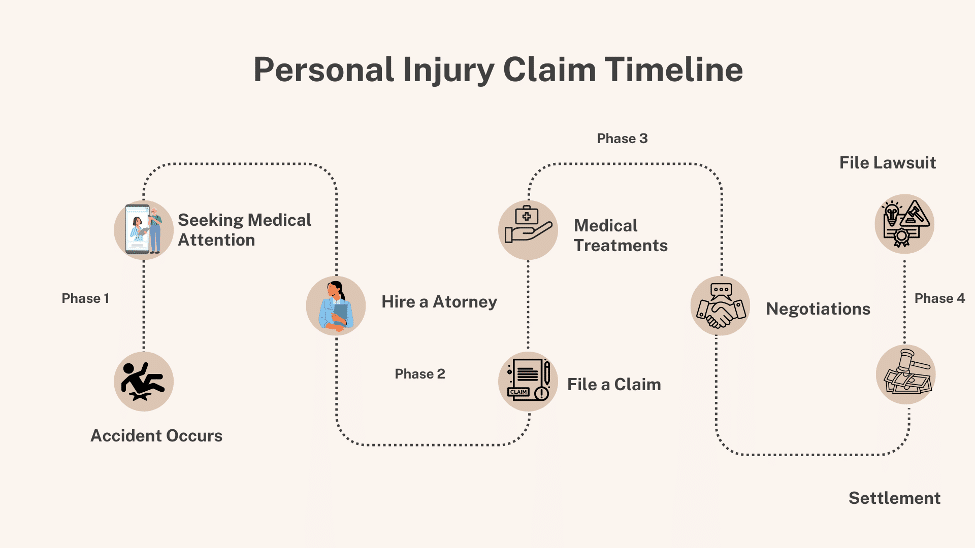Suffering an injury due to someone else’s negligence can be a traumatic and life-altering experience. Beyond the physical pain and emotional turmoil, you may face mounting medical expenses, lost income, and uncertainties about your future well-being. In such situations, seeking advice from experienced personal injury attorneys can be invaluable in safeguarding one’s rights and interests.
This comprehensive guide delves deep into the complexities of safeguarding your health rights in personal injury claims. By arming yourself with knowledge and strategies, you can navigate this intricate legal landscape with confidence and ensure that your rights are upheld every step of the way.
Understanding Your Health Rights Post-Injury
In the aftermath of a personal injury caused by another party’s negligence or wrongdoing, you have specific health rights protected by state and federal laws. These rights encompass access to adequate medical treatment, fair compensation for your injuries, and legal representation to advocate on your behalf.
Facing the complex legal landscape alone can be extremely challenging. That’s why many victims choose to seek guidance from experienced personal injury attorneys. Firms like Slaughter & Lupton Personal Injury Lawyers have a deep understanding of personal injury law and a proven track record of protecting their clients rights. Their team of dedicated lawyers works tirelessly to ensure that clients receive the medical care and compensation they deserve. They fight against insurance companies and other parties that may try to minimize or deny valid claims.
The scope of health rights in personal injury law includes:
- The right to seek medical attention from providers of your choice: You are not obligated to visit doctors or facilities recommended by the at-fault party or their insurance company.
- The right to have all reasonable and necessary medical expenses covered: This includes costs for emergency treatment, hospitalization, surgeries, rehabilitation, prescribed medications, and ongoing care related to your injuries.
- The right to compensation for lost wages and diminished earning capacity: If your injuries prevent you from working or limit your ability to earn an income, you are entitled to compensation for these financial losses.
- The right to long-term care, rehabilitation services, and ongoing treatment as needed: Depending on the severity of your injuries, you may require ongoing physical therapy, home healthcare, assistive devices, or other long-term support services to maximize your recovery and quality of life.
Various legal frameworks safeguard these health rights, including personal injury statutes, insurance regulations, and precedents established through landmark court cases that have shaped the landscape of personal injury law over time.

Immediate Steps to Take Following a Personal Injury
Protecting your health rights begins with taking prompt and decisive action immediately after sustaining an injury. These initial steps not only prioritize your well-being but also lay the groundwork for building a strong personal injury claim:
1. Document the injury and accident scene: Gather as much evidence as possible, including photographs of the accident site, your injuries, and any visible damage or hazards that contributed to the incident. Obtain contact information for witnesses who may have seen what happened. Request copies of any official accident reports filed by authorities.
2. Seek immediate medical attention: Your health should be the top priority. Promptly seek medical evaluation and treatment, even if your injuries seem minor initially. This not only addresses your immediate medical needs but also creates a crucial paper trail documenting the nature and extent of your injuries from the very beginning.
3. Report the incident: Notify relevant authorities or institutions promptly, depending on the circumstances of your injury. For example, if you were injured in a car accident, file a police report and consult with a car accident lawyer or car accident attorney. If the incident occurred at work, report it to your employer. If you were injured on someone else’s property, inform the property owner or manager and consider consulting with a slip and fall lawyer’s personal injury.
By taking these proactive steps in the immediate aftermath of your injury, you establish a solid foundation for preserving your rights and building a strong case for the compensation you deserve.
Understanding Insurance Claims and Medical Care
Dealing with insurance companies can be a daunting and frustrating process, but it’s crucial to understand your rights and the obligations these companies have toward you.
- Insurance providers are legally required to act in good faith and handle claims promptly and fairly. They must conduct thorough investigations, provide clear explanations for any denials or delays, and make reasonable efforts to settle valid claims.
- You have the right to access and obtain copies of your complete medical records. These records are invaluable in substantiating the severity of your injuries, the treatment you’ve received, and the potential need for ongoing care. Insurance companies cannot withhold or tamper with these documents.
- Strategies to ensure full coverage of medical treatments may include negotiating with insurers, seeking second medical opinions, and exploring alternative treatment options. If an insurer disputes the necessity or cost of a recommended treatment, you can provide additional medical evidence or explore more affordable yet effective alternatives.
Understanding the complex world of insurance claims can be challenging, especially when dealing with the physical and emotional aftermath of an injury. Seeking guidance from an experienced personal injury lawyer, car accident lawyer, medical malpractice attorney, or catastrophic injury lawyer can prove invaluable in protecting your rights and ensuring you receive the medical care and compensation you deserve.
Legal Representation and Its Impact on Protecting Health Rights
Choosing the right legal representation can make a significant difference in the outcome of your case and the protection of your health rights. When evaluating potential personal injury attorneys, look for those with:
- Extensive experience in personal injury law: A seasoned lawyer will have in-depth knowledge of relevant statutes, case law, and legal strategies specific to personal injury claims.
- A track record of successful settlements and verdicts: Review the attorney’s history of securing fair compensation for clients, including cases involving complex injuries and long-term medical needs.
- A client-focused approach: Look for a lawyer who takes the time to understand your unique situation, addresses your concerns, and keeps you informed throughout the legal process.
A skilled personal injury lawyer, medical malpractice personal injury lawyer, catastrophic injury attorney, or pedestrian accident lawyer can advocate for your health rights in numerous ways:
- Conducting thorough investigations: They will gather evidence, interview witnesses, and consult with medical experts to build a strong case substantiating the full extent of your injuries and medical needs.
- Negotiating with insurance companies: Experienced lawyers know how to navigate the tactics insurers may use to minimize payouts. They can effectively negotiate to ensure fair compensation for your medical expenses, lost income, and future care requirements.
- Representing your interests during settlement negotiations or at trial: If settlement offers are inadequate, your lawyer will be prepared to take your case to trial and present a compelling argument for the compensation you deserve.
- Ensuring that your long-term health needs are accounted for: A skilled attorney will fight to secure provisions for ongoing care, rehabilitation services, and future medical expenses in any settlement or award.
By leveraging their expertise and resources, personal injury lawyers can navigate the complexities of the legal system and fight tirelessly to protect your fundamental rights to comprehensive medical care and fair compensation.
Long-Term Health Rights and Rehabilitation
In cases involving severe injuries, disabilities, or chronic conditions, your health rights extend far beyond immediate medical treatment. You may be entitled to:
- Long-term care and rehabilitation services: Depending on the nature and severity of your injuries, you could require ongoing physical therapy, occupational therapy, speech therapy, or other rehabilitative services to regain function and independence.
- Access to specialists and ongoing treatment options: Your injuries may necessitate care from various medical specialists, such as neurologists, orthopedists, or pain management experts. You have the right to seek treatment from qualified providers to maximize your recovery.
- Legal protections against premature case closures by insurance providers: Insurance companies may attempt to close your case prematurely, claiming that you have reached maximum medical improvement. However, you have the right to challenge such decisions and continue receiving necessary care if your condition warrants it.
Understanding these long-term health rights and advocating for them throughout the claims process is essential. Failure to secure appropriate ongoing care and support services can compromise your recovery, quality of life, and overall well-being.
Preparing for Settlements and Court Cases
As your personal injury claim progresses, preparation becomes paramount – whether you’re negotiating a settlement or heading to trial:
1. Settlement negotiations: Gather all relevant documentation, including medical records, bills, and expert testimony. Understand the strengths and weaknesses of your case, and have a clear understanding of your desired outcome.
2. Trial process: Familiarize yourself with court procedures, prepare for questioning, and work closely with your legal team to present a compelling case that underscores the impact of your injuries on your health and well-being.
Throughout these processes, your legal team will be invaluable in advocating for your health rights and ensuring that any settlement or award adequately addresses your current and future medical needs.
By following these guidelines and working closely with experienced legal professionals, individuals can navigate the complexities of personal injury claims while protecting their fundamental right to quality healthcare and fair compensation.
Frequently Asked Questions
What are the most common challenges faced when asserting health rights in personal injury claims?
Some of the most common challenges include pushback from insurance companies seeking to minimize payouts, difficulties in proving the full extent and long-term implications of injuries, and limited understanding of one’s legal rights and options.
How can I ensure that my health rights are fully protected throughout the personal injury claim process?
To safeguard your health rights, it’s essential to document everything meticulously, seek prompt medical attention, consult with a skilled personal injury lawyer, and remain proactive in advocating for your needs throughout the claims process.
What should I do if my insurance company denies a claim related to my injury treatment?
If your insurance company denies a claim, you have the right to appeal the decision. Your personal injury lawyer can guide you through the appeals process, gather additional evidence, and potentially take legal action if the denial is deemed unjustified.
Take Action to Protect Your Rights
Facing the complexities of personal injury claims can be daunting. However, by understanding your health rights and taking proactive steps, you can increase your chances of securing the medical care and compensation you deserve.
Don’t hesitate to consult with a reputable personal injury lawyer who can advocate for your rights at every step of the way. Remember, your health and well-being should be the top priority, and you have legal protections to ensure that your rights are upheld.
